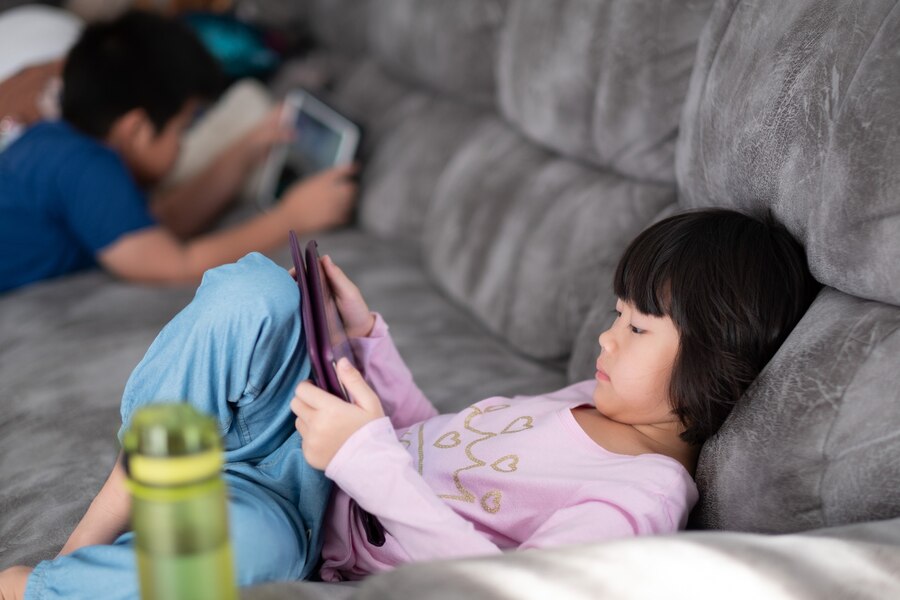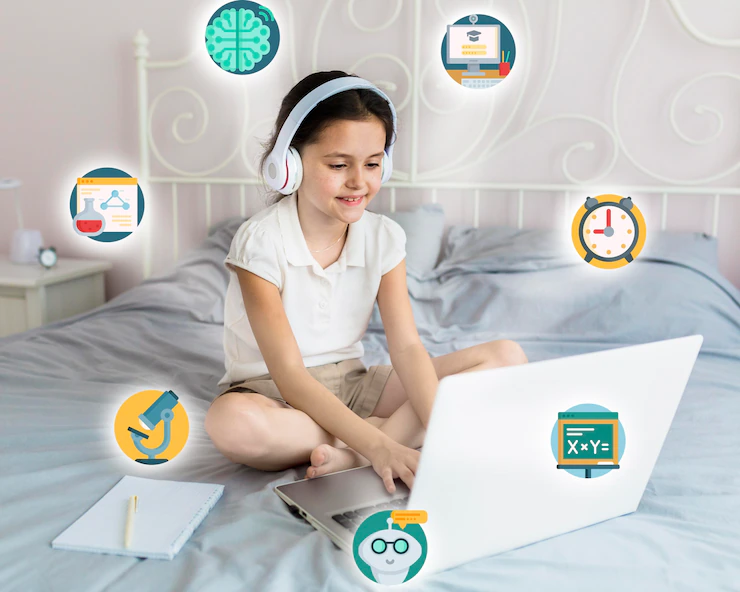
In today's rapidly evolving digital landscape, children have become extremely familiar with various digital screens, including those of mobile phones, computers, televisions, tablets, and more. While technology undeniably provides educational benefits and various forms of entertainment, its impact on the physical, mental, and learning development of children is significant. As a result, regulating the amount of time children spend in front of screens has emerged as a formidable challenge for parents in this digital age.

The Negative Impact of Too Much Screen Time On Children
Childhood is a critical phase for both mental and physical growth and development. Prolonged screen exposure, which involves excessive use of phones and computers, can lead to obesity and its associated health problems due to decreased physical activity, an elevated risk of Myopia due to consistent screen proximity, disrupted sleep patterns and insomnia caused by screen-emitted light, along with potential memory issues.
Apart from the aforementioned physical harm, there are also psychological repercussions. A child who consistently engages with screens might acquire deficiencies in essential social skills that are expected to develop during their age, as they have less face-to-face interaction with peers and others. Research indicates that children exposed to excessive screen time could display symptoms such as insensitivity, aggression, and a poor attention span.
To Deter Children from Excessive Screen Time
Given the prevailing trend, completely shielding children from screen exposure is not a simple task. Therefore, as parents, it becomes imperative to consider strategies for managing our children's phone usage. We'd like to present a few simple yet impactful approaches.

(1) Establish Clear Rules
It's essential to offer children clear guidelines about when and for how long they can use screens, which specific programs they have permission to watch, and so on. Offering children a clear explanation that reducing screen time is crucial for allocating additional hours to schoolwork, outdoor social interactions, and participation in physical activities will enhance their compliance with the rules. Parents play a significant role as their children's primary educators, making it crucial for them to moderate their own phone usage as well. However, establishing rules for your child while using your phone in their presence undermines the effectiveness of these rules.
 (2) Allocate More Time to the Child
(2) Allocate More Time to the Child
To decrease their child's screen time, parents should increase the time spent engaging and playing with them. Activities such as storytelling, coloring together, and playing indoor games like Monopoly are recommended. Children naturally divert their attention from screens when they're relishing interactive playtime with their parents. Furthermore, having screen-free intervals during meal times and before bedtime is crucial, not just for children but also for adults. Throughout these periods, families should concentrate on enhancing communication and bonding with one another.

(3) Engaging with the Outside Environment
Amidst the urban lifestyle characterized by a growing number of apartments, space for children to run and play is diminishing. With the demands of school and extra lessons, leisure time is becoming rare for children. Those who lack both play areas and free moments tend to resort to their phones for relaxation, turning leisure activities into screen time. Furthermore, as education shifts to online platforms, children find themselves dedicating more hours to screen-based activities. It is essential, therefore, to provide children with ample free time and to take them to spaces where they can run and play. Children need to break away from apartment settings and immerse themselves in a more natural environment.

Age-Appropriate Screen Time Guidelines for Children
In accordance with the guidelines from the American Academy of Pediatrics, we have provided recommended screen time for children based on their age. These guidelines serve as general recommendations, and we advise that you make adjustments based on your child's specific circumstances.
| From birth to one and a half years old: During this period, it is advisable to completely avoid screen time, except for video calls with relatives who are far away from home. |
| From one and a half to two years old: Children at this stage can gradually begin engaging with monitored and beneficial content under parental supervision. |
| From two to five years old: Limit screen time to child-friendly programs, such as educational content, for a maximum of one hour per day. |
| From six to twelve years old: For school-aged children, who should remain physically active and nurture relationships, it is recommended to have a moderate amount of screen time that doesn't interfere with schoolwork or other activities. The total should not exceed two hours per day. |
Childhood is a crucial stage for achieving optimal mental and physical growth. Throughout this period, it is essential to cultivate qualities like empathy, kindness, and affection, nurture a strong parent-child bond, and prioritize the maintenance of physical well-being. Digital screens offer numerous benefits to children, allowing them to explore new technologies, languages, and relaxation, necessitating parents to carefully manage screen time to preserve the child's psychological and physical well-being.




Hsu
Nay Tun
Eaint Hmue Thakhin